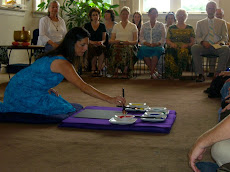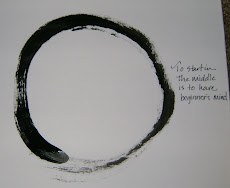I went back this morning and re-read Roshi Joan Halifax's essay,
Learning as Initiation: Not-knowing, Bearing Witness, and Healing. This essay was the impetus for my thesis. Though I've read it over many times, I always seem to find new pieces of it that I hadn't read the way I had before.
I specifically picked up the essay this morning because the other day during our Greek Fest at school, I had a couple of moments where I felt like my students and I experienced "bearing witness."
Halifax explains (per the second phase of Roshi Bernie Glassman's "Peacemaker Order") that "...'bearing witness'...emphasizes being fully present to the suffering and joy in oneself and the world." Later in her essay she says, "we realize that the relative and the absolute are interdependent. Samsara and nirvana are one. We also realize that intellectual or emotional reactions are not an absolute...that this present moment will pass..."
On Thursday morning, each of my students presented an oral, memorized mythology story where the character they had researched was the "star" of the story. Some of my students did an incredible job of really bringing the story to life, using costumes, props, "coloring their words," bringing characters to life, and connecting with their audience (the rest of the class). Other students did a fairly good job, while other students struggled. However,
all of the students shared a story and, therefore, we were all able to support one another in a shared endeavor. We also had the opportunity to hear the interconnectedness of the ancient Greek myths, and therefore, make connections amongst ourselves.
One of my students attempted to start his story twice, but by the time he got to the third line, he "went up" on his lines (forgot the words). This particular student has a tendency to get frustrated with himself when he doesn't do something "right," or "well enough." We (his classmates and I) all watched as he balled his fists tightly by his sides, tightly closed his eyes (to keep from crying) and looked up to the ceiling (maybe so we wouldn't "see"). He stood like that for quite a few moments.
As gently as I could I said, "[His name], imagine that I have just told you about my weekend. Then imagine you went and told somebidy else exactly what I said. That's what you're doing here. You are simply re-telling a story. A story that you know really well." He relaxed a bit. After a few moments, this student, quietly began to tell his story. There were no bells and whistles, no really expressive moments, but he got through the entire story. His classmates cheered.
Later, during our second round of stories, one of the girls was telling her tale about Artemis, and how she lost her love, Orion. She choked up and stopped, because she couldn't go on. At firs, I was unclear if she couldn't remember the story or she was simply moved by it. Three of the other female students jumped out of their seats and went to hug her. I let this go on for a few moments and then asked the other girls to sit. I asked the student telling the story to continue, if she could. She did. When she finished her story, she too, received a round of cheers and applause.
"Bearing witness" ...being fully present for all of it: the joy and the sorrow, the challenge and the triumph. I think that happened on Thursday.
Besides the story-telling, my students teamed up with the other Sixth Grade section for a team game of Greek Trivial Pursuit, Crazy Olympics, and also had the opportunity to dine on Greek food (served with the help of classroom parents), and watch one another's "three-actor" plays (in ancient Greece, there were never more than three actors in a play, so for a week in drama the students tripled up to create plays based on a theme, and gave their final performance at Greek Fest).
Though Greek Fest wasn't an actual "rite of passage," it bore many of its elements: it was an opportunity for "students to learn through their own experiences, by creating specific educational settings where learners can really 'take the plunge'; by helping them touch the mythic imagination; helping them nurture wisdom and compassion through not-knowing and bearing witness" (Halifax, 1999, p. 179).
What Greek Fest most certainly supported was a "community of learners." Each of us learned from one another and alongside one another. We listened, we shared, and we celebrated all that we had learned previous to that day, and, in the process, learned some more.








